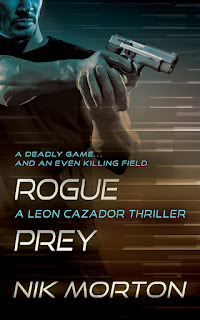ORGAN SYMPHONY published by Rough Edges Press
Some crime subjects don’t go away. Organ harvesting is one of them. It crops up in the news from time to time. It’s also the inciting incident that starts this Leon Cazador novel.
Occasionally, I like to book-end a tale – with a quote or image at the beginning and end of the book; for this one, I chose the word ‘heartless’:
August, 2016 - Lazzaretto Piccolo, Laguna Veneto, Italy
Gho Jun chuckled beneath his surgical mask and in his high-pitched voice joked, “Soon our rich client will be heartless, no?”
It doesn’t give anything away to reveal the book’s last line, here:
Carlota nodded. “Truly, Leon, those who ban people from listening to music are heartless.”
By no means exclusively, but in my books (and even some short stories) I attempt to feature places I’ve visited. Here, we go to Venice, Charleston, South Carolina, Cape Cod, Massachusetts, Stockbridge, Córdoba and Torrevieja in Spain and Tokyo. The story ranges from 2016 to 2022.
‘Nik Morton is really
good at creating characters and describing action scenes.’ – a reader’s comment.
Amazon UK: https://tinyurl.com/szhr9s82
Amazon US: https://tinyurl.com/y2hdryym
Organ Symphony – a few excerpts:
By chance all three stayed together, and were trucked to
South Carolina. Here, Rafael was taken away – it must have been about two weeks
ago – and returned with a bandage wrapped round his body. One of the older kids
showed his own operation scar, proudly displaying it as a badge of honor, and
said, “They start on the bits we’ve got two of – like kidneys, eyes, lungs...”
The rest was left unsaid. (p25)
***
Normally
on weekdays they would exercise after waking. With Carlota sitting enticingly
on his ankles, he would perform seventy sit-up crunches, alternate elbow to
alternate knee, followed by seventy press-ups. Carlota did the same, though she
was faster than him – but then again she was younger. After breaking a sweat,
they would shower. At the weekend they would refrain and instead perform tai
chi in a convenient park for a complete change.
But
he’d vowed that on this mini-holiday they would give that form of physical
exercise a miss. “Only that form of exercise?” she queried mischievously.
“Quite,”
he answered straight-faced. (p97)
***
A
mountainous landscape populated by dragons strode out of the swathes of
hammam’s steam and approached Leon Cazador and Carlota.
Leon
wasn’t surprised when Carlota stifled a gasp.
Hiroki
Kuroda was tattooed over his entire torso and down to his wrists and calves. At
a glance, he gave the impression that he was wearing long johns; instead, he
was a walking exhibition of body art. Ray Bradbury’s Illustrated Man always sprang to mind
when Leon saw him, but this was no fantasy. As a member of the Yakuza—a
Japanese criminal organization similar to the Mafia, but much older—Hiroki as a
much younger man had endured hundreds of hours of pain from a bamboo sliver
simply to show that he could. He waved a greeting with his left hand. The
little finger should have been missing at the first knuckle, but a shining
substitute appeared grafted in place.
Sitting
on the wooden slats of the bench, Leon wore light blue swimming shorts and
Carlota, on his left, was skimpily covered by a dark green bikini she’d brought
for use in the hotel pool but had yet had the opportunity to christen.
Hiroki adjusted the towel about
his waist, acknowledged Carlota, and lowered his huge bulk on Leon’s right.
(p109)
***
In the blink of an eye Leon
raised the pistol and harshly whipped Okudara’s face with the silenced barrel.
The man backed against the
shelving and rubbed his chin.
“Carlota,” Leon called over his
shoulder, “shoot the other guy’s knees from under him if he so much as blinks!”
Leon aimed his automatic at
Okudara’s left knee. “I can even things up,” he said. “You can limp with both
legs.” (p167)
***
“We haven’t packed enough
clothing to go gallivanting,” Carlota said. “We were only supposed to spend a
couple of days in Córdoba.”
“We’re not gallivanting,” Leon
corrected. “This isn’t recreation, my dear, it’s hunting.”
She kissed him. “I like it when
you put on your serious face. Sends shivers down my spine.”
He hugged her and traced his
fingers down her spine. “This isn’t getting the packing done, is it?”
“There’s time for that, don’t
fret, my hunter.” And there was; time for everything. (p179)
***
Once they were back in their hotel room, Leon unwrapped the
brown-paper parcel. Rose had managed to meet his specifications as to size,
stopping power and weight. The Beretta Model 84 weighed a mere twenty-three
ounces and was only six and a half inches long, suitable for concealing on
Carlota’s person. Its magazine held thirteen rounds.
To fill his shoulder holster he’d
opted for a Bernardelli P-018, its magazine holding fifteen 9mm parabellum
cartridges. The slightly smaller and lighter Tanfoglio TA90 snugly fitted his
ankle-holster; it too held fifteen 9mm parabellum cartridges. Rose had also
supplied a spare clip of cartridges for each weapon. Between them they should
have enough fire-power to deal with a crop of organ harvesters, he reckoned.
(p199)
***
“You’re wet,” he observed. She
wasn’t wearing a bra under her clinging white bandeau.
“I can see why you’re a private
eye.” She grinned. “Don’t worry, I’m not going to catch my death. The sun and
the warm breeze will soon dry me.”
“Hope not – catch death, I mean.”
He revved the boat forward.
She stood and moved to his side.
“We all die, eventually, darling.”
He hugged her with one arm while
steering. “Let us not hasten the inevitable, eh?” (p213)
***
That, I hope, will provide a flavour at least...






























